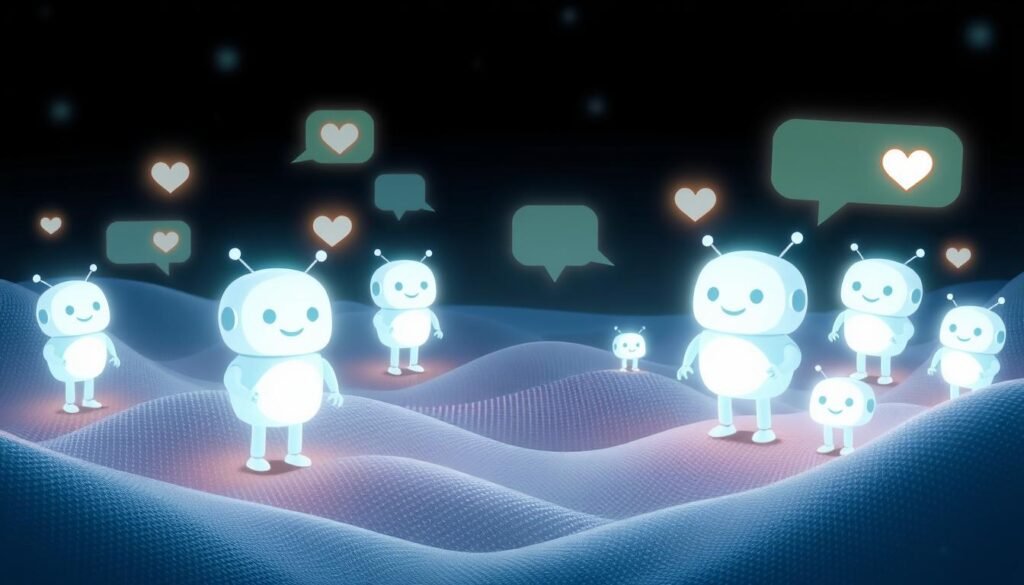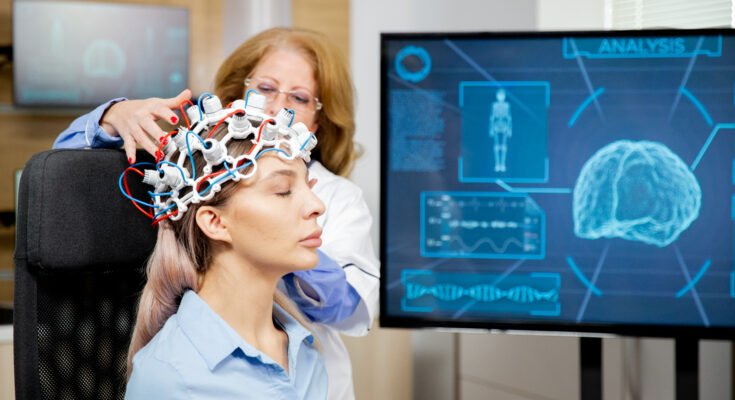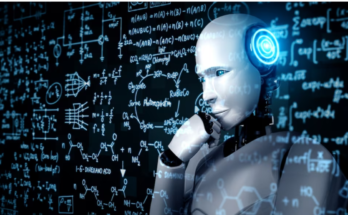AI in Mental Health:
In today’s fast-paced world, mental health is more important than ever. We’re turning to technology for help, and AI is leading the way. It’s changing how we care for our minds.
We’ll look at how AI is changing mental health care. From new diagnostic tools to treatments tailored just for you, we’ll cover it all. These advancements are making a big difference in how we think about mental health.
AI’s natural language processing and sentiment analysis are amazing. They help us understand emotions and hidden feelings better than ever before. We’ll also see how chatbots and AI in psychology are improving mental health checks and treatments.

Key Takeaways
- AI is revolutionizing the field of mental health care, offering innovative diagnostic tools and personalized treatment approaches.
- Natural language processing and sentiment analysis are enabling the decoding of emotions and the unveiling of hidden sentiments.
- Empathetic mental health chatbots and AI-powered psychological profiling are enhancing mental health assessments and interventions.
- AI-driven technologies are transforming the way we understand and address mental well-being.
- The integration of AI in mental health care is paving the way for a more personalized and effective approach to mental health treatment.
Harnessing the Power of AI for Mental Well-being
Artificial intelligence (AI) is changing mental health care. It uses natural language processing (NLP) to understand emotions. This helps doctors see deeper into a person’s mind, leading to better care.
Natural Language Processing: Decoding Emotions
NLP looks into the details of what we say and write. It finds emotions that we might not even notice. This lets doctors give better support, making care more personal and effective.
Sentiment Analysis: Unveiling Hidden Sentiments
Sentiment analysis goes further than NLP. It digs into the feelings behind what we say. This helps doctors understand patients better, creating plans that really help.
AI, NLP, and mental health are merging in exciting ways. This could change how we care for our minds. We’re moving towards care that’s more empathetic and tailored to each person.
“The integration of natural language processing and sentiment analysis in mental health care is paving the way for a more nuanced understanding of the human experience, ultimately leading to more effective and compassionate interventions.”
AI for Mental Health
AI is changing mental health care in big ways. It’s not just for diagnosing anymore. Now, AI helps make therapy better and offers new ways to handle mental health. For example, AI-powered CBT programs give personalized exercises and help for depression and anxiety.
AI also helps spot mental health problems early. It looks at data from social media and wearables to find warning signs. This means help can come sooner, making a big difference in people’s lives.
| AI-Powered Mental Health Innovations | Key Benefits |
|---|---|
| Personalized CBT Programs | Customized guidance and exercises to manage conditions like depression and anxiety |
| Early Detection of Mental Health Issues | Proactive identification of warning signs through data analysis, enabling timely intervention |
| Sentiment Analysis of Online Behavior | Uncovering hidden emotional patterns to provide targeted mental health support |
As AI gets better, we’ll see more changes in mental health care. We’ll see more personalized therapy and early help. AI is making a big difference, helping people live healthier, happier lives.

“The integration of AI in mental health care is not just a technological advancement, but a fundamental shift in how we approach the well-being of individuals.”
Empathetic Companions: Mental Health Chatbots
Mental health chatbots are changing the game. They use natural language processing and machine learning to talk to us. These digital friends offer coping strategies and can spot mental health issues early.
Conversational AI: A Listening Ear
Mental health chatbots are more than just automated responses. They listen without judgment, anytime and make mental health support available to all, helping break down barriers.
They guide us in self-care, offer emotional support, and suggest professional help when needed. This technology is a big step forward in mental health support.
The use of mental health chatbots and conversational AI is a game-changer. These digital helpers analyze our words and mood, offering tailored advice. They provide support that’s both private and easy to access.

“These digital companions are not just automated responses; they are empathetic listeners, capable of providing a non-judgmental, 24/7 outlet for those in need.”
The growth of mental health chatbots and conversational AI is a big leap. It brings mental health support to everyone, making it personal and easy to get. This technology helps us deal with our emotions and find well-being.
Psychological Profiling with AI
AI is changing how we look at mental health. It uses advanced tech to read facial expressions and voice tones. This helps understand a person’s feelings and mental health better.
It helps doctors make detailed profiles. This leads to treatments that really fit each person. And it makes patients feel better.
Emotion Detection: Uncovering Internal Landscapes
AI’s emotion detection is a big step forward. It can spot tiny emotional changes. This lets doctors see what’s going on inside a person’s mind like never before.
AI looks at non-verbal signs to understand a person’s mind. This helps doctors give better help. It’s a big leap in helping people with their mental health.
As AI for mental health grows, we’ll see more cool uses. Psychological profiling and emotion detection are changing mental health care in amazing ways.

“The integration of emotion detection into AI-powered psychological profiling is a game-changer.”
| Benefit | Description |
|---|---|
| Comprehensive Psychological Profiles | AI-powered emotion detection can provide mental health professionals with a more holistic understanding of an individual’s psychological state, leading to more personalized treatment plans. |
| Improved Patient Outcomes | By accurately identifying emotional patterns and trends, AI can help mental health providers deliver more effective interventions and support, resulting in better patient outcomes. |
| Enhanced Mental Health Support | As the technology continues to advance, we can expect to see even more innovative applications of psychological profiling and emotion detection that empower individuals on their mental health journeys. |
Conclusion
AI is changing how we deal with mental health. It helps find problems early and offers treatments that fit each person. It also brings us chatbots that listen and care.
AI gets better at understanding our feelings and talking to us. It uses special tools to know how we’re doing and help us feel better. This means we can get help that really fits our needs.
We’re excited for what AI will do next in mental health. It could make getting help easier and more personal. We’re looking forward to a future where everyone gets the support they need.
FAQ
How can AI-powered natural language processing help in mental health assessments?
AI-powered NLP looks at language patterns and word choices. It can spot emotional states and mental health issues. This helps professionals understand a person’s mental health better, leading to accurate diagnoses and treatment plans.
What is the role of sentiment analysis in mental health care?
Sentiment analysis is part of NLP. It uncovers hidden feelings in what people say or write. This helps professionals understand a person’s mental state better, leading to more effective treatments.
How can AI-driven cognitive behavioral therapy (CBT) programs assist in mental health management?
AI-driven CBT programs offer personalized exercises and guidance. They help manage conditions like depression and anxiety. These programs provide support on demand, helping individuals manage their mental health.
What are the benefits of empathetic mental health chatbots powered by conversational AI?
Empathetic chatbots offer emotional support anytime. They use AI to have meaningful conversations and suggest coping strategies. They can also spot signs of mental health crises, making help more accessible.
How can AI-powered emotion detection aid in psychological profiling?
AI emotion detection looks at facial expressions and voice tone. It helps understand a person’s emotional state and mental health. This technology leads to more detailed profiles and better treatment plans.



